By Leigh-Ellen Romm
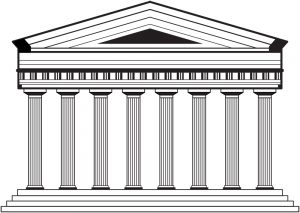 The Athenian Oath speaks of loyalty to the city that residents of ancient Athens had pledged to protect, and Dan Johnson quotes it with ease and sincerity. “We will strive unceasingly to quicken the public’s sense of civic duty. Thus, in all these ways, we will transmit this City not only, not less, but greater and more beautiful than it was transmitted to us,” he recites, then goes on to say, “Our city has had an amazing first orbit of development. It’s the birthplace of telecommunication with Texas Instruments and Collins Radio in the mid-1950s and is now enjoying a huge renewal effort as new businesses are coming in and redeveloping older areas.” That “orbit” has positioned Richardson as a high-technology corporate setting to more than 700 companies and 100,000 people.
The Athenian Oath speaks of loyalty to the city that residents of ancient Athens had pledged to protect, and Dan Johnson quotes it with ease and sincerity. “We will strive unceasingly to quicken the public’s sense of civic duty. Thus, in all these ways, we will transmit this City not only, not less, but greater and more beautiful than it was transmitted to us,” he recites, then goes on to say, “Our city has had an amazing first orbit of development. It’s the birthplace of telecommunication with Texas Instruments and Collins Radio in the mid-1950s and is now enjoying a huge renewal effort as new businesses are coming in and redeveloping older areas.” That “orbit” has positioned Richardson as a high-technology corporate setting to more than 700 companies and 100,000 people.
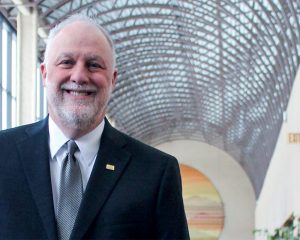
With 42 years of experience in public administration, Dan Johnson ’77 says it was an internship at the City of Sherman while a student at Austin College that helped him find his way into the field. In the 1970s, law was the presumed track for most Political Science majors like Johnson, but he says he was haunted by the idea of something else.
“I walked into the City of Sherman offices and said, ‘Hi, I’m here. I work really hard,’” Johnson said. As an Austin College senior, he completed a directed study with the city that included hands-on work in the city offices, along with required readings and reports. He also assisted with the Community Development Block Grant Program through the U.S. Department of Housing and Urban Development. That summer after graduation, he returned to work and then stayed on in full-time employment while pursuing a master’s degree in Public Administration at the University of North Texas. By the time he was 22 years old, he had gone from Administrative Assistant to Budget Officer for the city.
“I think the thing Austin College did and does well is teach a spectrum of topics,” Johnson said. “It seems to me that a healthy liberal arts education actually parallels a healthy community spectrum with variety and diversity. For a city, it’s not only what the city does but also the school district and all the other providers that make up a set of institutions, like churches, social service agencies, you name it—all the ones that make up a community working together,” he said.
I distinctly remember my Economics professor, Dr. Daniel Nuckols, explaining that the majority of the material that students learned during their time at Austin College would be outdated within 10 years of graduating. The key take-away from that lesson was that the material itself was not the lesson. Instead, the liberal arts mantra is ‘learning how to learn’ and then continuing the lifelong learning for professional and personal success.”
Johnson reminisced about the Austin College course “Heritage of Western Man” and its application to community work. “We were challenged with viewpoints, philosophies, and arguments about personal liberty, relationships to God, and embedded philosophies around governance. Those are the same things that now show up in council candidates as the rhetoric of their platforms and positions,” he said. Those studies remind him to pay attention to the development of the whole community—just like the development of the whole person.
“In all the ways the Athenian soldiers pledged their allegiance, some people pledge their lives to the community saying, ‘I will try to manage these things we hold dear,’ so others are free to do other things,” Johnson said.
Adapting to the ever-changing world while ascribing to an ancient oath, Johnson is a leader in his profession and a warrior for his community.
Dr. Frank Rohmer, Associate Professor of Political Science and The John D. Moseley Chair in Government and Public Policy, has taught many Austin College students who have gone on to successful careers in public administration. “By bringing the liberal arts to bear upon public problems, the public administrator can give a reasoned and disciplined voice to the people’s demands, often making opinion more civil in its expression and public in its reach,” he said. “Austin College students who work in public administration have demonstrated a willingness to subordinate their personal ambition to serve the public good and to expand their vision to see problems as a whole.”
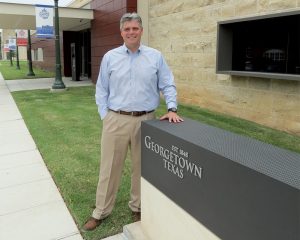
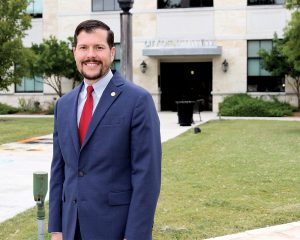 E.A. Hoppe ’04, Deputy City Manager of Kerrville, Texas, and David Morgan ’82, City Manager for Georgetown, Texas, worked with and were mentored by Johnson during the early years of their public administration careers. They share common appreciation for the benefits of their Austin College education.
E.A. Hoppe ’04, Deputy City Manager of Kerrville, Texas, and David Morgan ’82, City Manager for Georgetown, Texas, worked with and were mentored by Johnson during the early years of their public administration careers. They share common appreciation for the benefits of their Austin College education.
“A career in public administration usually requires a broad skill set,” said Morgan. “I work with a team to spin lots of plates at one time and am constantly calibrating to changing priorities. My degree established a strong foundation in critical thinking, persuasive writing skills, and emotional intelligence. These strengths are timeless.”
Hoppe added, “Regardless of the professional arena, public management in today’s fast-paced and rapidly evolving society requires mental nimbleness and a commitment to lifelong learning.
Another Voice for Good
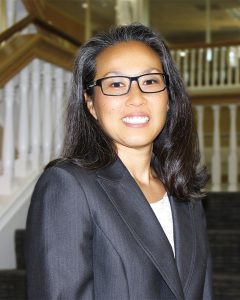 A Small World
A Small World
Traci Leach shared that she is one of six Austin College alumni who now work for the City of Coppell, with others serving as a captain in the city’s Fire Department, the Director of Community Development, the City Secretary, the Budget Officer, and a police officer.
Traci Leach ’97, now Deputy City Manager for the City of Coppell, Texas, hasn’t worked directly with Dan Johnson but learned early in her career that he was well-respected in North Texas—and not just in local government circles. Upon completing a master’s degree in Public Administration in 1999, she began her career in city management in Farmers Branch, Texas. She later spent nearly seven years as Assistant City Manager of LaPorte, Texas, before joining the City of Coppell team in 2017.
Leach had opportunities to meet Johnson along the way. “Being able to connect through our common ties to Austin College provided a great conversation starter for me as an early career professional when we met back in the mid-2000s,” she said. “Dan is the consummate professional and has always been gracious with his time and advice when our paths have crossed at conferences.”
“I love working in local government, where we have the opportunity to create relationships with the people we serve,” Leach said. “In this time of change and uncertainty, I believe that we, as local government professionals and public servants, are building communities where people feel like they belong.”
I distinctly remember my Economics professor, Dr. Daniel Nuckols, explaining that the majority of the material that students learned during their time at Austin College would be outdated within 10 years of graduating. The key take-away from that lesson was that the material itself was not the lesson. Instead, the liberal arts mantra is ‘learning how to learn’ and then continuing the lifelong learning for professional and personal success.”
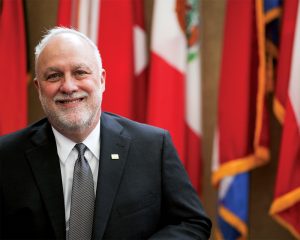 Johnson reminisced about the Austin College course “Heritage of Western Man” and its application to community work. “We were challenged with viewpoints, philosophies, and arguments about personal liberty, relationships to God, and embedded philosophies around governance. Those are the same things that now show up in council candidates as the rhetoric of their platforms and positions,” he said. Those studies remind him to pay attention to the development of the whole community—just like the development of the whole person.
Johnson reminisced about the Austin College course “Heritage of Western Man” and its application to community work. “We were challenged with viewpoints, philosophies, and arguments about personal liberty, relationships to God, and embedded philosophies around governance. Those are the same things that now show up in council candidates as the rhetoric of their platforms and positions,” he said. Those studies remind him to pay attention to the development of the whole community—just like the development of the whole person.
“In all the ways the Athenian soldiers pledged their allegiance, some people pledge their lives to the community saying, ‘I will try to manage these things we hold dear,’ so others are free to do other things,” Johnson said.
Adapting to the ever-changing world while ascribing to an ancient oath, Johnson is a leader in his profession and a warrior for his community.
